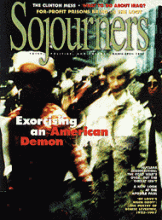In the first stage of the White House sex scandal, the media was obsessed with how allegations of sexual misconduct and possible cover-up against Bill Clinton might bring down his presidency. "Can Clinton survive?" was the question reporters barraged us with that week. The best answer was, "We'll have to wait until we really know what happened." Of course, the high velocity and fiercely competitive media couldn't do that as they rushed to judgment, turning even mere rumors into instant news stories in a bigger press frenzy than even the death of Princess Diana had created. During Watergate, it took two reliable sources to confirm a controversial news story, but those standards have long since been abandoned.
The second stage of the scandal began with Bill Clinton's successful State of the Union speech and Hillary Clinton's vigorous attack on her husband's critics. When the media saw public opinion polls much more favorable to Clinton than to them, they changed their message dramatically. The press then began saying that the public cares more about the president's policies than they do about his sex life, and started asking religious and moral leaders whether they were appalled by this attitude. Instead of asking, "What's more important, the president's morality or his political agenda?" we should have been asking about the connections between the two.
Read the Full Article
